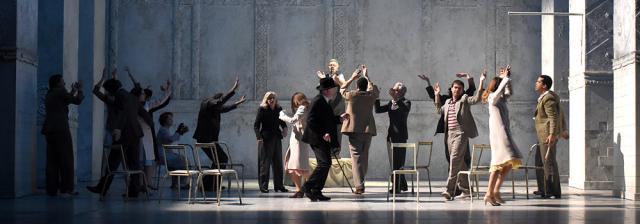
Romeo and Juliet, Shakespeare’s tragedy of young lovers had not been staged by the Comedie-Francaise since the ‘50s. Since one of its primary missions, says Eric Ruff, is to “re-expose legendary plays that have become part of the collective memory,” he aimed to get through the many historical interpretations of the play to an essential: to tell a story. He wanted not to omit Shakespeare’s rough-and-toughness, luxuriance, and humor but use the mix and make his language accessible by wedding it to action. Often, he also has characters interacting with the audience by speaking out directly. For the most part, I think Eric Ruff has succeeded. He’s updated the scene to Italy (I’d say a town like Palermo) between WW I and WW 2. Though retaining white-walled architecture and some traditions of a glorious past, it’s a place of poverty where remains a civil war between important families and their adherents. In the main square where Capulets hold a feast that Romeo Montague (slightly swaggering Jeremy Lopez, resembling a young Al Pacino), crashes to dance with a gal he has a crush on, he sees and falls for Juliet. When, at a break in dancing, they meet in the off-square community wash room, she cools her face with a splash of water from one of the row of sinks. He slides over to her and, holding her hands, gently blows remaining moisture away. It’s an unforgettable romantic moment, demanding the kisses that follow. What isn’t as successful is the balcony scene, shifted to a dark square with a single very tall column in its center. Atop this (How did she climb?), Suliane Brahim’s sweet, conflicted Juliet reveals her love. I was thankful Romeo hid in a shadow below her ledge, showing the audience his eagerness to hear. Had he moved forward to see her, he’d have been looking up her skirt! Only when she sits, dangling her unshod feet (a distraction!), does he come into the moonlight for their exchange. Juliet wears only a slip not only during her bedroom wedding night with Romeo but throughout the later encounter with her father, her mother, and even Paris, as she’s made to promise to marry him. Highly unlikely, that bedroom scene! There’s an unintentionally funny bit in the tomb at the play’s end. Juliet’s encased in a mummy-like structure painted with her image. She’s standing up and speaks awkwardly when she wakes. After both dead Paris and Romeo flank her, one on each side, she has to ungracefully slip out of an opening in the bottom of her case and onto the floor. No attention at all is paid to Tybalt in his structure (Did it serve him right for having been such a louse?), even though there’s a veritable mob scene in the tomb at the finale. If anyone’s death scene is serious and lamentable, it’s Mercutio’s. His charm, which includes directly “working” the audience, excuses his flamboyance and willingness to promote a scrape. Pierre Louis-Calixte makes Mercutio’s beautiful Queen Mab speech seem natural to him even if he is essentially a gang leader. I’m not sure who played Benvolio when I attended the play, but he was a believable would-be peace maker. I also liked whoever played Paris on October 4; he came off as good but not too good to be true. Claude Mathieu’s Nurse isn’t as important or as amoral, and Daniele Lebrun’s Lady Capulet, is less harsh than as usually depicted. Didier Sandre’s Lord Capulet believably changed his disposition rapidly, yet in all instances keeping authoritarian. Both actors portraying priests acquitted themselves well. Those who played themselves — that is, young guys and girls — might have come out of a cast of West Side Story except for their nationalities and dress. They even danced well, but then so had everyone at that initial street feast.
